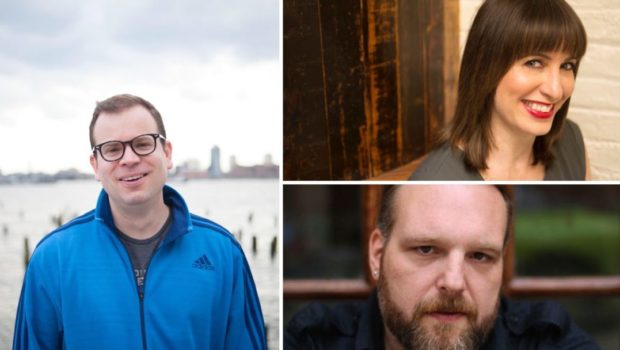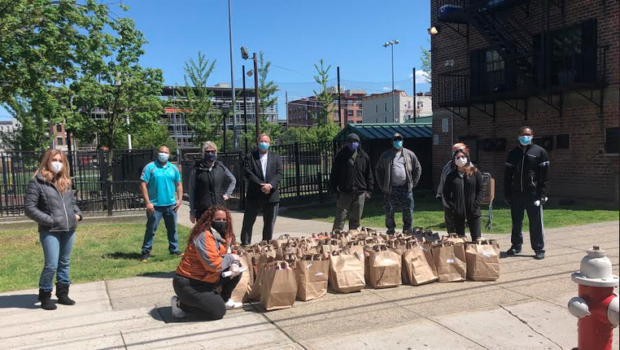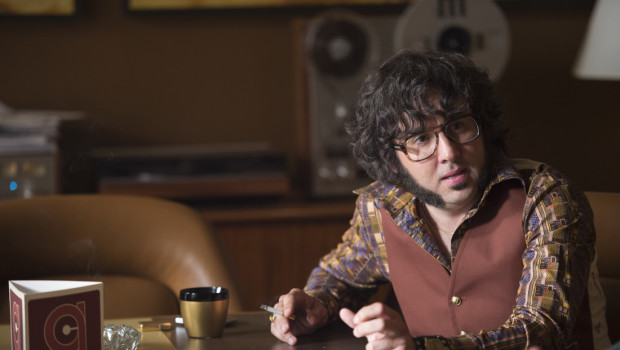
FACES: Carlos Alomar — Musician/Songwriter/Producer Discusses Collaborations with David Bowie and More…
You know that old adage of “Those who can’t teach do, and those who can’t do teach?” There are plenty of exceptions, and I would argue Carlos Alomar to be a textbook example of someone who both teaches and does. After 30 or so years as a successful musician, songwriter and producer, he started working with Hoboken’s Stevens Institute Of Technology. He began as an adjunct professor, and now serves as both the Director of the Sound Synthesis Research Center (SSRC) for the Performing Arts and the school’s Distinguished Artist in Residence.
A resident of North Bergen for over a decade, Carlos grew up in New York, beginning young as a musician. As a teenager, he played alongside one of childhood best friends, Luther Vandross, in Listen My Brother. Other gigs around that time included playing in the house band of The Apollo Theater and working as a session player at RCA Recording Studios. Ultimately, Carlos encountered David Bowie, for whom he played on nearly a dozen studio albums. Carlos co-wrote some gems from the Bowie catalog including “The Secret Life Of Arabia,” “Dancing With The Big Boys,” and Bowie’s first U.S. #1 hit, “Fame.”
The musical activity kept up plenty for Carlos beyond his work with David Bowie. He has been a part of recording sessions and/or touring duties with the likes of Mick Jagger (Carlos co-wrote two songs on She’s The Boss), Iggy Pop (he played lead guitar on “Lust For Life”), Paul McCartney (guitar work on the Press To Play album), Bruce Springsteen, and the Duran Duran side-project Arcadia. Success continued into the 2000s with Carlos’ contributions to Alicia Keys’ The Element Of Freedom, The Scissor Sisters’ TA-DAH, and Bruno Mars’ record-breaking hit with Mark Ronson, “Uptown Funk.”
Carlos – who can be followed online at www.carlosalomar.com – kindly answered a few questions for hMAG.
hMAG: You still play with notable musicians, having played on recent recordings by Bruno Mars, The Scissor Sisters, and Alicia Keys. How do gigs usually come to you these days?
Carlos Alomar: Work comes to me through various contacts. My publicist Doreen D’Agostino, my website… I still hold a high-profile in the Grammys and so many well-known producers, like Ann Mincieli, Tony Visconti, Hugh Padgham and Mark Ronson know me. These producers reach out to me directly, but basically believe it or not, the phone rings and I answer it. I’ve been in the music industry for quite some time and I’m well-known amongst my peers.
H: In collaborating with David Bowie on and off for three decades, do you feel that there are any misconceptions about him?
C: I think the misconception is that people think that he was the characters that he played, which in fact, he was not. David was a brilliant man, and although many might think of him as calculating and serious, he and I shared a mutual curiosity and humor. He was loving, genuine, generous and very humorous.
H: Do you have a professional accomplishment you’re most proud of?
C: 35 gold or platinum albums, and my name in the music registry of the Library of Congress…ain’t bad.
H: Music you’ve written has been covered by other artists over the years. Of those covers, do you have a favorite?
C: I just love Lea DeLaria’s tribute to David Bowie with her new CD, House Of David. It’s just brilliant! Bowie classics with unbelievable jazz arrangements.
H: In your opinion, is musical theory essential for a working professional musician to learn these days?
C: Although there are many accomplished and successful musicians who have never studied theory, I feel that any form of music theory is better than none at all. When I was young, I bought a book by Mel Bay that was called Mel Bay’s Guitar Dictionary, and it said that I could learn how to play 2000 chords. Well, the fact that I could play 2000 chords separated me from my friends. I also think that my ability to offer David Bowie chord theory, chord substitution and scale-wise progressions is what allowed David and I to explore so many genres of music with an open mind.
H: When you’re not busy with work, how do you like to spend your free time?
C: I enjoy spending time with my family. Going to the beach. Going to the movies. Easy living and a nice glass of wine.
H: I’ve read that your daughter is pursuing a career in music. Is that something that you had encouraged her to do?
C: My daughter Lea Lorien has been singing since she was a child. I think that children learn by example. My wife Robin Clark is a great singer, having sung with Chic, Simple Minds, Luther Vandross, Bowie and others. I don’t think there’s any way she could not have become a great musician.
H: Finally, Carlos, any last words for the kids?
C: Be curious, embrace technology and remember, your greatest teacher is your last mistake.


 Previous Article
Previous Article Next Article
Next Article BEST FRIEND FOR HIRE: Best-Selling Author Mary Carlomagno Returns to Hoboken to Showcase Her New Novel—TUESDAY @ Maxwell’s
BEST FRIEND FOR HIRE: Best-Selling Author Mary Carlomagno Returns to Hoboken to Showcase Her New Novel—TUESDAY @ Maxwell’s  STORYTELLERS AT STEVENS: Adam Wade, Ophira Eisenberg & Peter Aguero — SATURDAY, SEPT. 22
STORYTELLERS AT STEVENS: Adam Wade, Ophira Eisenberg & Peter Aguero — SATURDAY, SEPT. 22  Hoboken Police Release Image of Suspects in Election Bias Crime
Hoboken Police Release Image of Suspects in Election Bias Crime  ASK YOUR BARTENDER: Mulligan’s Will Ayers
ASK YOUR BARTENDER: Mulligan’s Will Ayers  WALTER SALAS-HUMARA: Guitar Bar Workshop Series Presents The Silos Singer/Songwriter—FRIDAY, APRIL 27th
WALTER SALAS-HUMARA: Guitar Bar Workshop Series Presents The Silos Singer/Songwriter—FRIDAY, APRIL 27th  Community Organizations Rally to Keep Hoboken Students Supplied
Community Organizations Rally to Keep Hoboken Students Supplied  ME&EM FOR GOOD: Jewelry Forged Through Friendship Continues Fight Against Childhood Cancer
ME&EM FOR GOOD: Jewelry Forged Through Friendship Continues Fight Against Childhood Cancer  FACES: “Vinyl” Star P.J. Byrne Puts the HBO in Hoboken
FACES: “Vinyl” Star P.J. Byrne Puts the HBO in Hoboken